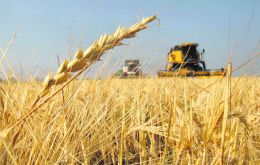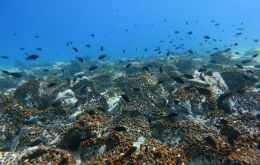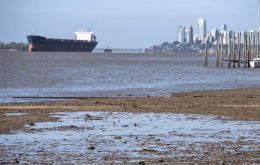MercoPress. South Atlantic News Agency
Tag: climate
-
Saturday, August 22nd 2020 - 08:30 UTC
Massive losses of sheep in Patagonia highlands because of intense snowstorms

Snowstorms and frosts in the high areas of the Argentine Patagonia Rio Negro province could cause the death of 70% of the flock, according to estimates from the provincial Livestock Secretariat, Tabaré Bassi.
-
Saturday, August 22nd 2020 - 08:05 UTC
Argentina's wheat crop under pressure from unfavorable climate conditions

Argentina's wheat crop continued to remain under pressure amid growing unfavorable weather conditions, which are casting doubts of further crop loss. Wheat planting in Argentina was 100% completed in the week to Aug. 19, but recent frost conditions, with variable intensity, have hit most parts of its key wheat regions, rendering current growth conditions unfavorable for the crop, the Buenos Aires Grain Exchange said in its report released on Aug. 20.
-
Monday, June 22nd 2020 - 07:50 UTC
Ocean floor topography to be completed by 2030; so far a fifth has been covered

Plans to map the entire ocean floor by 2030 are going ahead despite the challenges of the coronavirus crisis, officials leading the project said, with almost a fifth covered so far.
-
Tuesday, April 14th 2020 - 08:45 UTC
Parana river water level hampering grain transport in the midst of peak harvest

Below normal rains in the Parana-Paraguay water basin is hampering grain transport through waterways in Argentina as the water level of the river has dropped significantly, Bolsa de Comercio de Rosario, or BCR, said in a report.
-
Tuesday, November 19th 2019 - 08:00 UTC
Record deforestation in the Amazon rainforest confirms official Brazilian data

Deforestation in Brazil’s Amazon rainforest rose to its highest in over a decade this year, government data on Monday showed, confirming a sharp increase under the leadership of right-wing President Jair Bolsonaro.
-
Tuesday, November 19th 2019 - 05:29 UTC
Hazardous levels of pollution in Sydney as bushfires advance on Australia's largest city

Sydney was shrouded in dangerous haze on Tuesday as smoke from bushfire blazing along Australia's eastern board sent contamination levels soaring in the country's biggest city.
-
Friday, July 26th 2019 - 10:11 UTC
Northern Europe literally frying in all time high temperatures; train travelers told to delay trips

Paris on Thursday baked in an all-time high temperature of 42.6 degrees Celsius as a ferocious heatwave smashed records across northern Europe, sparking concerns about public health and causing new misery for rail travellers.
-
Monday, July 15th 2019 - 09:37 UTC
No fatalities as Hurricane Barry hits Louisiana but spares New Orleans

No serious injuries or major damage were reported as Barry reached the state of Louisiana Saturday as a Category 1 hurricane. It did not hit New Orleans directly but caused power cuts and brought floods to several areas along the southern part of the Mississippi River.
-
Tuesday, October 2nd 2018 - 09:12 UTC
NASA scientists solve mysteries of the Earth's rotation wobbling

Using satellite data on how water moves around Earth, NASA scientists have solved two mysteries about wobbles in the planet's rotation - one new and one more than a century old. The research may help improve our knowledge of past and future climate.
-
Saturday, September 22nd 2018 - 08:30 UTC
Argentina ready to launch a satellite to monitor natural disasters and soil moisture

Argentina is launching a new microwave imaging satellite to monitor natural disasters and soil moisture, in a long-term bid to bolster the farm sector, an industry that has historically been the backbone of the country’s economy.
